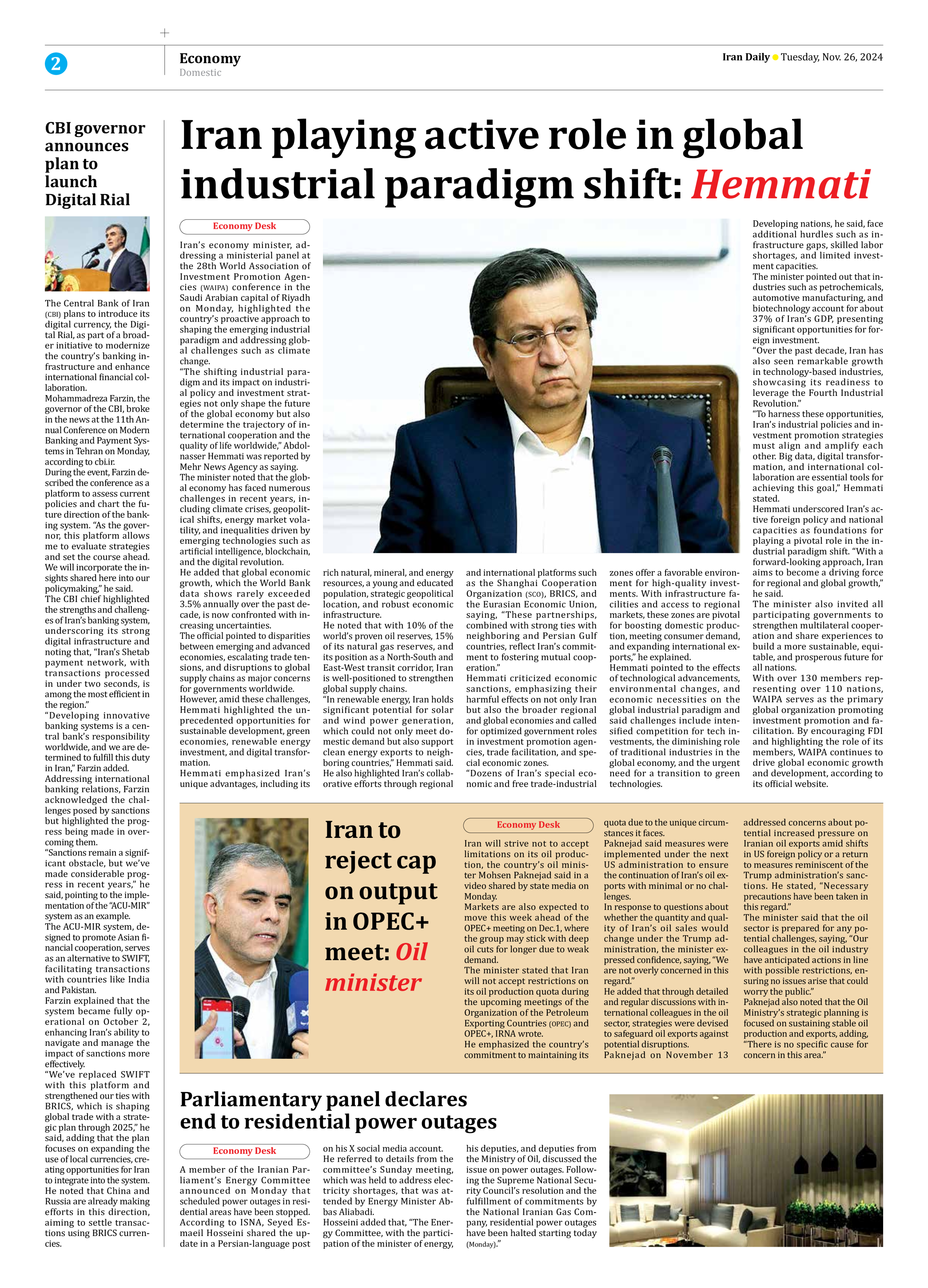
Iran playing active role in global industrial paradigm shift: Hemmati
Iran’s economy minister, addressing a ministerial panel at the 28th World Association of Investment Promotion Agencies (WAIPA) conference in the Saudi Arabian capital of Riyadh on Monday, highlighted the country’s proactive approach to shaping the emerging industrial paradigm and addressing global challenges such as climate change.
“The shifting industrial paradigm and its impact on industrial policy and investment strategies not only shape the future of the global economy but also determine the trajectory of international cooperation and the quality of life worldwide,” Abdolnasser Hemmati was reported by Mehr News Agency as saying.
The minister noted that the global economy has faced numerous challenges in recent years, including climate crises, geopolitical shifts, energy market volatility, and inequalities driven by emerging technologies such as artificial intelligence, blockchain, and the digital revolution.
He added that global economic growth, which the World Bank data shows rarely exceeded 3.5% annually over the past decade, is now confronted with increasing uncertainties.
The official pointed to disparities between emerging and advanced economies, escalating trade tensions, and disruptions to global supply chains as major concerns for governments worldwide.
However, amid these challenges, Hemmati highlighted the unprecedented opportunities for sustainable development, green economies, renewable energy investment, and digital transformation.
Hemmati emphasized Iran’s unique advantages, including its rich natural, mineral, and energy resources, a young and educated population, strategic geopolitical location, and robust economic infrastructure.
He noted that with 10% of the world’s proven oil reserves, 15% of its natural gas reserves, and its position as a North-South and East-West transit corridor, Iran is well-positioned to strengthen global supply chains.
“In renewable energy, Iran holds significant potential for solar and wind power generation, which could not only meet domestic demand but also support clean energy exports to neighboring countries,” Hemmati said.
He also highlighted Iran’s collaborative efforts through regional and international platforms such as the Shanghai Cooperation Organization (SCO), BRICS, and the Eurasian Economic Union, saying, “These partnerships, combined with strong ties with neighboring and Persian Gulf countries, reflect Iran’s commitment to fostering mutual cooperation.”
Hemmati criticized economic sanctions, emphasizing their harmful effects on not only Iran but also the broader regional and global economies and called for optimized government roles in investment promotion agencies, trade facilitation, and special economic zones.
“Dozens of Iran’s special economic and free trade-industrial zones offer a favorable environment for high-quality investments. With infrastructure facilities and access to regional markets, these zones are pivotal for boosting domestic production, meeting consumer demand, and expanding international exports,” he explained.
Hemmati pointed to the effects of technological advancements, environmental changes, and economic necessities on the global industrial paradigm and said challenges include intensified competition for tech investments, the diminishing role of traditional industries in the global economy, and the urgent need for a transition to green technologies.
Developing nations, he said, face additional hurdles such as infrastructure gaps, skilled labor shortages, and limited investment capacities.
The minister pointed out that industries such as petrochemicals, automotive manufacturing, and biotechnology account for about 37% of Iran’s GDP, presenting significant opportunities for foreign investment.
“Over the past decade, Iran has also seen remarkable growth in technology-based industries, showcasing its readiness to leverage the Fourth Industrial Revolution.”
“To harness these opportunities, Iran’s industrial policies and investment promotion strategies must align and amplify each other. Big data, digital transformation, and international collaboration are essential tools for achieving this goal,” Hemmati stated.
Hemmati underscored Iran’s active foreign policy and national capacities as foundations for playing a pivotal role in the industrial paradigm shift. “With a forward-looking approach, Iran aims to become a driving force for regional and global growth,” he said.
The minister also invited all participating governments to strengthen multilateral cooperation and share experiences to build a more sustainable, equitable, and prosperous future for all nations.
With over 130 members representing over 110 nations, WAIPA serves as the primary global organization promoting investment promotion and facilitation. By encouraging FDI and highlighting the role of its members, WAIPA continues to drive global economic growth and development, according to its official website.







